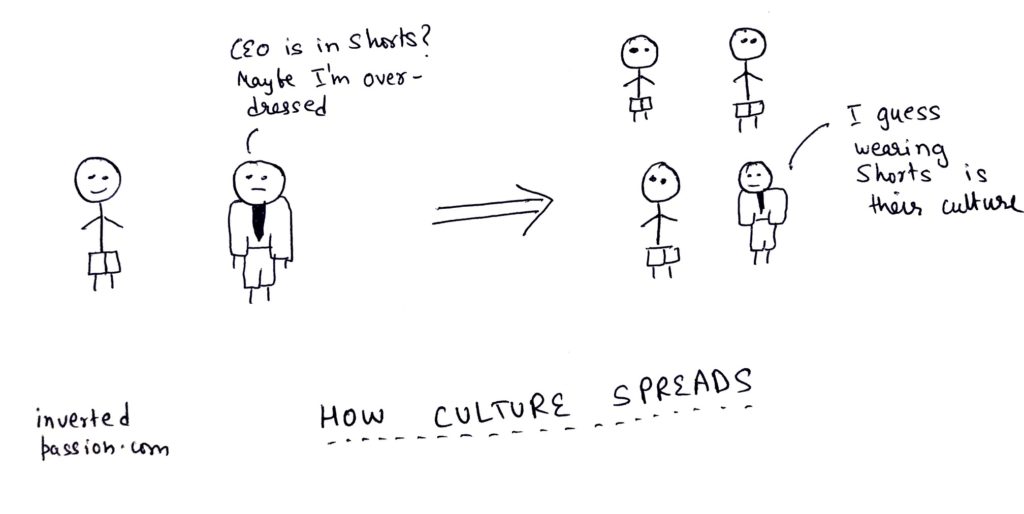Have you seen this famous video on Youtube where one guy dances and it keeps on attracting other people to join him? Soon enough this one person’s weird dance is a group dancing together. In case you haven’t, check it out (it’s just 3 minutes long):
Organizations grow similarly. Whether the founding team intends to or not, every startup project ends up acquiring cult-like habits. Here’s how that happens.
What makes company cultures different from each other?
Imagine your name is Paras and you’re the founder of a startup project (it could be a company, a non-profit, a religion or even a country). You have a weird habit: you like to come to office by noon and stay late (say until 8pm). You hire your first employee, and on the first day he comes to office at 9am (just like he did in his previous job). The empty office seems odd to him, and it becomes odder still when he sees you stroll by in office during his lunchtime. In the evening, since it’s the first day of his job, he waits for you to leave but the entire time, you are happily busy on your laptop. You leave office by 9pm and a couple of minutes after you, the new hire leaves. Thinking of his first day as a fluke, the new employee comes in early again tomorrow but the same thing repeats.
As you can guess, new employees usually don’t confront their bosses in early days, so their bosses’ weird habits gradually become their weird habits. Soon enough, everyone adapts to the noon-8pm work timings. As the team grows, for new hires, the situation looks like a cult (who comes to office at noon and leaves at 8pm?) but they have increasingly less chance of changing it.

It’s interesting to note that the more people an organization adds and the more time passes, the harder it is for anyone (including old members) to change these joint-habits. In the same example, imagine that the company has grown to 100 people and the CEO has had a change of heart. He declares that the noon timing is no longer OK and that everyone has to come to office sharp 9 am in the morning. How do you think this proposal will be perceived by the company?
The criticism will likely be one among these: “our culture is changing”, “It’s not like old days anymore” and “Here are 99 reasons why noon-8pm is the best timing”. It’s only fair that people don’t like to change their habits and they have confidence when those habits are shared widely around them. If the CEO faces resistance in changing these culturally ingrained joint-habits, imagine how difficult will it be for anyone else (including new joiners) to try doing the same.
Organizations maximize both good and bad habits
It’s not just weird habits, organizations maximize all habits of early founders. Founders like to read? They’ll attract, retain and encourage people to read. Soon enough – that becomes a culture thing. In America’s case, since their founding fathers gave great emphasis on freedom of gun owning, changing that now is political suicide for US politicians. Similarly, China’s totalitarianism that started with Mao Zeodong’s reflects today in their government’s tracking and rating citizens. Apple’s maniacal focus on design continues even after the death of Steve Jobs. If Travis grew Uber by brashly skirting and breaking regulations, it shouldn’t be any wonder that they had a culture where anything and everything was OK.
When people say, why can’t China now adopt democracy given that they have everything else going for them, they’re missing the point that an organization resists change in habits. Either such changes are very gradual and take a long time to slowly change organizational habits or a revolution brings a sudden but destructive change. The usual mode of operation for organizations is to maximize and amplify existing habits.
Join 200k followers
Follow @paraschopra